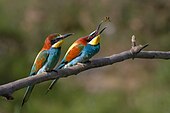English
 bee-eater
bee-eater
Merops apiaster
Etymology
From the diet of these birds, which consists of flying insects, especially bees and wasps.
Pronunciation
Noun
bee-eater (plural bee-eaters)
- Any of various brightly-coloured, insectivorous, near-passerine birds in the family Meropidae, especially the European bee-eater, Merops apiaster.
- Used other than figuratively or idiomatically: see bee, eater.
Translations
bird in the family Meropidae
- Arabic: وَرْوَار m (warwār)
- Armenian: մեղվակեր (hy) (meġvaker)
- Catalan: abellerol (ca) m
- Chechen: жӏалин-къоьрг (žˀalin-qʼörg)
- Chinese:
- Mandarin: 食蜂鳥/食蜂鸟 (shífēngniǎo), 食蜂鸟 (shífēngniǎo), 蜂虎科 (fēnghǔ-kē) (family)
- Czech: vlha (cs) f
- Danish: biæder c
- Dutch: bijeneter (nl) m
- Esperanto: abelmanĝulo, meropo
- Finnish: mehiläissyöjä (fi)
- French: guêpier (fr) m
- Galician: meixengra, abellaruco (gl)
- German: Bienenfresser (de) m
- Greek: μελισσοφάγος (el) m (melissofágos)
- Ancient: μέροψ m (mérops)
- Hungarian: gyurgyalag (hu), piripió, méhészmadár (hu)
- (deprecated template usage)
{{trans-mid}}
- Irish: beachadóir m
- Italian: gruccione (it) m, vespiere m
- Japanese: ハチクイ (hachikui), ハチクイ科 (hachikui-ka) (family)
- Korean: 벌잡이새 (beoljabisae)
- Latin: merops m
- Maltese: qerd in-naħal m
- Navajo: tsísʼná yiyání
- Polish: żołna (pl) f
- Portuguese: abelharuco (pt) m, mejengra (pt) f
- Romanian: viespar (ro), albinărel (ro) m, prigoare (ro) f, prigorie (ro) f
- Russian: щу́рка (ru) f (ščúrka)
- Scottish Gaelic: beachadair m
- Spanish: abejaruco (es) m
- Swedish: biätare (sv) c
- Tagalog: manunubing, parikparik
- Telugu: పచ్చరెక్క (paccarekka)
- Walloon: wespî (wa) m
|
References

 bee-eater on Wikipedia.Wikipedia
bee-eater on Wikipedia.Wikipedia  Meropidae on Wikispecies.Wikispecies
Meropidae on Wikispecies.Wikispecies  Category:Meropidae on Wikimedia Commons.Wikimedia Commons
Category:Meropidae on Wikimedia Commons.Wikimedia Commons